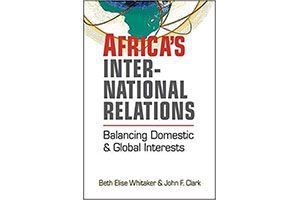Dr. Beth Whitaker’s new book

New Book: Africa’s International Relations: Balancing Domestic and Global Interests
Why do African leaders cultivate ties with some foreign powers and not others? How do civil conflicts in African countries at times expand to engulf entire regions of the continent? Why have leaders enhanced the capabilities of international organizations like the African Union while undermining the authority of bodies such as the International Criminal Court?
In their new book, Africa’s International Relations: Balancing Domestic and Global Interests, Dr. Beth Elise Whitaker (UNC Charlotte) and Dr. John F. Clark (Florida International University) situate these questions and others at the nexus of comparative and international politics. They argue that the external relations of African countries are shaped by domestic imperatives. Most African leaders, even those chosen through free and fair elections, face threats to their power both from within their governments and from opposition groups (non-violent or armed). To mitigate these risks, African leaders cultivate international relationships that will help secure their hold on power. Whether negotiating loan conditions with international financial institutions, developing regional trading blocs, responding to violence in neighboring countries, or fostering ties with traditional Western powers or emerging ones like China, therefore, the pursuit of regime security influences the types of external actors with whom African leaders seek to partner and the terms of the resulting relationships.